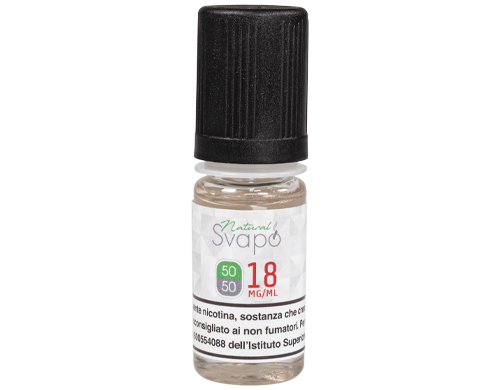Modified on: 24/05/2024
Here is what nicotine salts do to the body
The use of nicotine salts in vaping has recently increased dramatically, especially in the USA. Although legal in our country, nicotine salts have not yet matched the success seen overseas, and home vapers still prefer liquid nicotine.
But what is different between these two products, and what is known about the impact of salts on health? In the following lines, you will find the differences between nicotine salts and liquid nicotine and whether the former can harm the body.


Nicotine salts: what they are and how they differ from liquid nicotine
Both nicotine salts and liquid nicotine are obtained by processes involving the processing of tobacco. So naturally, there is excellent curiosity around the former as, although they are an older product than the latter, they are a more recent innovation in vaping. So let’s see how they are obtained.
Let’s start with a premise: the nicotine present in tobacco is a molecule characterised by a chemical composition typical of salt; therefore, by extracting it from tobacco leaves, we obtain its natural form, which is rather basic; this characteristic means that it assimilation is easy at very high temperatures (combustion) but difficult at lower temperatures (vaping). That is, unless one soaks the leaves in an acidic compound such as citric acid or benzoic acid: in this way, one obtains a product – nicotine salts – whose intake gives more immediate and robust effects even in the absence of combustion.
On the other hand, liquid nicotine is obtained by extracting the pure molecule from tobacco through a treatment that includes the application of caustic soda. In short, to put it simply, nicotine salts are the result of treating nicotine in its natural state, while liquid nicotine is a compound containing this substance in its pure form. Since nicotine is taken by vaping with an electronic cigarette, it is common to use liquid nicotine, but some vapers prefer salts.
Let’s find out why.
Read also: GLO or IQOS? Main differences (and why the best alternative to blondes is still vaping)
What changes in vaping if you use nicotine salts instead of liquid nicotine
As we have said, the nicotine in tobacco is not pure. However, with combustion, this is quickly assimilated by the body. But with vaping? To take up nicotine in its natural form with an electronic cigarette would require a vaping temperature that is too high. This is why liquid nicotine is mainly used in vaping: as it is pure, it is also released without combustion.
There is a problem, however: during vaping, a standard amount of liquid nicotine is assimilated very slowly, and its effects are short-lived. Here, for a smoker approaching vaping in an attempt to quit smoking, this could be a negative factor as they would risk feeling dissatisfied with the low amount of nicotine assimilated and experiencing withdrawal symptoms. The most apparent remedy might seem to be to increase the dosage. Too bad, however, that in this way, the throat hit risks are so substantial that the vaping experience becomes unpleasant (remember that liquid nicotine is pure).
On the other hand, nicotine salts are absorbed much more quickly and allow an aspiring ex-smoker to switch from an analogue to an electronic cigarette without much difference in satisfaction. This product, as well as being swiftly assimilated, can be dosed to a greater extent without affecting the aromatic yield of vaping.
It should be noted, however, that the perception of inhaled nicotine can vary from person to person; many novice vapers also manage to compensate for nicotine withdrawal by vaping more frequently. So, naturally, this leads to higher consumption of vaping liquids and nicotine bases.


Side effects and addiction: what we know about nicotine salts
The use of nicotine salts is less widespread than in America. However, it is understandable that a curious vaper might be interested in trying this product. Only after, however, knowing whether taking nicotine salts might harm health.
Now, nicotine is not exactly a substance that doctors recommend. Besides being addictive, it can have side effects such as increased blood pressure and heart rate, not vasoconstriction. Therefore, nicotine is not suitable for you under any circumstances and in any form.
However, because those who switch to vaping usually decide to get rid of a harmful vice and all its implications (including nicotine addiction), it would be best to avoid salts. Unlike liquid nicotine, which can be progressively reduced and help a smoker free himself from addiction, nicotine salts risk keeping him hooked on this need, keeping the spectre of a return to smoking alive.
They also require atomisers with specific characteristics to take them up, and adopting unsuitable technology could alter their properties and even make them harmful.
Read also: What are the lightest cigarettes for health? They don’t exist!
In conclusion
Little is known about nicotine salts, so it isn’t easy to judge. In any case, remember that vaping is a practice in which it is not necessarily necessary to use nicotine products. For example, a vaper who chooses an electronic cigarette to avoid smoking an analogue cigarette can opt for vaping liquids without nicotine or create his customised mixture by mixing the e-liquid base and vaping flavours.
At Terpy, you can find a wide selection of electronic cigarette liquids with and without nicotine.










